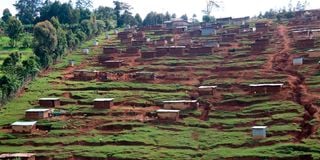Premium
How degazettment of Mau forest land has come back to haunt locals

An Internally Displaced Persons (IDPs) camp in Narok South subcounty on June 28, 2022 where Mau Forest evictees put up after being evicted
What you need to know:
- In the ensuing court battle, the families claim they were illegally evicted from the land, which they claim is not part of the forest, and are seeking compensation.
- They asked the court to declare that the decision by the police to forcefully evict his clients by burning their houses and destroying their property violated their rights as enshrined in Articles 10, 26, 29 & 40 of the Constitution
The legality of the directive by two former cabinet ministers to degazette 35,000 hectares of land in the eastern part of Mau Forest for human settlement is the subject of controversy in the legal battle for compensation by families evicted from forest land in 2017.
The Environment and Lands Court in Nakuru has been asked to determine the legality of gazette notification number 889 of 2001 and gazette notification number 142 of 2001, which announced the intention to degazette and alter the boundaries of the eastern part of Mau Forest to degazette 35,000 hectares of forest land.
The gazette notice number 889 was issued by the then Minister of Environment, the late Francis Nyenze, on January 30, 2001, while his successor, Noah Katana Ngala, issued gazette notice number 142 of 2001 in August 2001.
In the ensuing court battle, the families claim they were illegally evicted from the land, which they claim is not part of the forest, and are seeking compensation.
The government, on the other hand, claims that the decision to evict the families was based on the need to restore the forest land, which it claims was encroached upon by the families.
In court on Monday, the families, through lawyer Bernhard Kipkoech Ng'etich, asked the court to declare that the decision by the police to forcefully evict his clients by burning their houses and destroying their property violated their rights as enshrined in Articles 10, 26, 29 & 40 of the Constitution.
According to Mr Ngetich, his clients were illegally evicted from their private land to which they had legal titles to prove ownership.
He urged the court to review the 2001 gazette notifications that led to the de-gazetting of 35,000 hectares for the settlement of the squatters.
Mr Ngetich argued that since the demarcation, there had been no other gazette notification to revoke the ministers' decision.
“If the gazettement was illegal, why has the government not taken steps to de-gazette it? Why have those ministers who issued the legal notices not been taken to court?” said Mr Ngetich.
Appearing before Justice John Mutungi, Mr Ngetich argued that the demarcated land gave rise to six blocks of settlement schemes in Njoro, Molo and Kuresoi constituencies, which border the eastern part of the Mau Forest.
He claimed that the eviction of his clients was politically motivated, pointing out that the government had never declared the correct boundaries of the forest and settlement schemes.
“We are pleading with the court to settle the matter and provide guidance on the boundaries. From history, every president that has served appears to have their boundaries. Is it possible that the boundaries are shifting? We cannot have four cutlines,” said Mr Ngetich.
Mr Steve Biko, who is also representing the families, argued that the state had not filed any case to challenge the legality of the 2043 titles held by the families, which prove ownership of the land.
Mr Biko noted that the government has never refunded the money it received from the families to process the title deeds, nor has it initiated any legal process to repossess the land.
“There is a procedure that the government ought to have taken before seeking to recover the land. My clients lost usage of the land during that period and could not develop nor charge the land,” said Mr Biko.
In its defence, however, the state, through lawyer Veronica Shirika, insisted that the government was interested in preserving the environment by restoring land that had been destroyed by human activity.
Ms Shirika argued that the process of degazettement of the forest land was done illegally, meaning that the subsequent acquisition processes, including the title deeds, were also illegal.
According to Ms Shirika, some of the title deeds produced in court were issued before the alleged degazettement.
“The Constitution does not protect the rights to property acquired illegally and unprocedurally. The petitioners cannot claim to have acquired land when there was no degazettement,” said Ms Shirika.
The court will issue a notice of judgment in due course.



